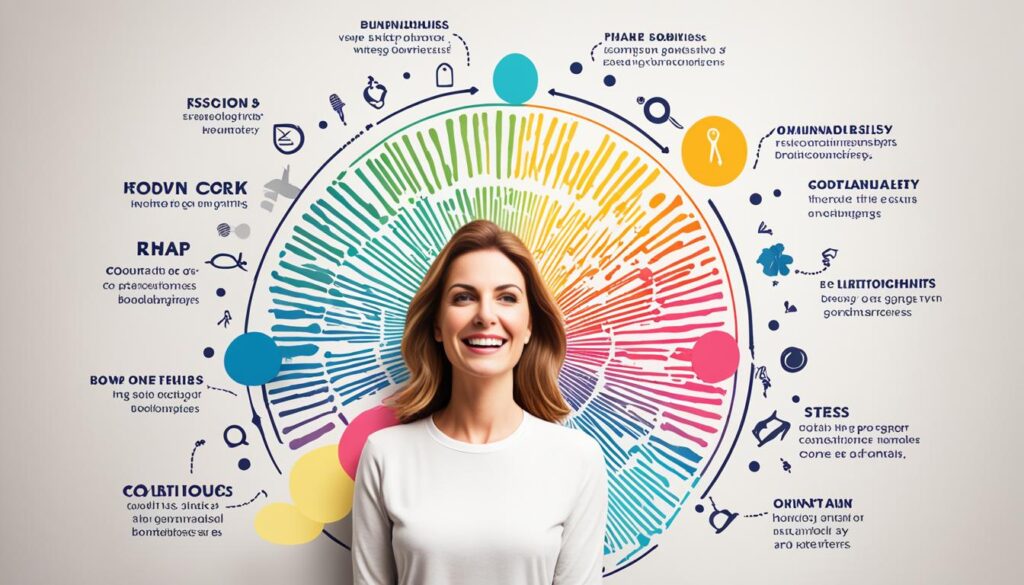“You only lose what you cling to.” – Buddha
Emotional boundaries play a vital role in our relationships and overall emotional well-being. They define the space between individuals, ensuring that both parties feel safe, respected, and heard. By setting healthy emotional boundaries, you create a foundation for positive connections and personal growth. In this article, we will explore the importance of boundaries in relationships, how to establish and maintain them, and the impact they have on our lives.
Key Takeaways:
- Healthy emotional boundaries are crucial for maintaining positive relationships and emotional well-being.
- Setting boundaries involves self-awareness and clear communication of your needs and expectations.
- Maintaining boundaries fosters personal autonomy and prevents resentment, manipulation, and abuse in relationships.
- Boundaries extend beyond personal relationships and are essential in professional settings, such as psychology and mental health therapy.
- By prioritizing self-care and effectively communicating boundaries, you can create a fulfilling and balanced life.
The Definition of Boundaries
Boundaries play a crucial role in defining who we are as individuals and how we interact with others. By establishing personal boundaries, we can create a sense of self and protect our emotional well-being. Let’s explore the different aspects of boundaries and understand their significance in self-care and personal growth.
Types of Boundaries:
Boundaries can be categorized into two main types: physical boundaries and interpersonal boundaries. Physical boundaries refer to the personal space we need to feel comfortable, while interpersonal boundaries involve setting limits on the behaviors and actions we find acceptable in our relationships. It is important to recognize that personal boundaries can vary based on cultural norms and social context.
Setting and Maintaining Boundaries:
Establishing boundaries is a vital component of self-care. It allows us to honor our needs and values while creating healthy relationships. By setting clear boundaries, we communicate our limits and expectations to others, fostering respect and understanding.
Here are some steps to establish and maintain personal boundaries:
- Reflect on your values and priorities.
- Identify the behaviors or situations that make you uncomfortable or cross your personal boundaries.
- Communicate your boundaries assertively and clearly.
- Respectfully enforce your boundaries and address any violations.
- Regularly reevaluate and adjust your boundaries as needed.
Remember, establishing boundaries is an ongoing process that evolves as we grow and change.
The Role of Boundaries in Self-Care:
Boundaries and self-care go hand in hand. When we set and maintain boundaries, we prioritize our well-being and preserve our emotional energy. By establishing personal boundaries, we protect ourselves from unnecessary stress, resentment, and burnout.
Setting boundaries also allows us to nurture healthy relationships. When we clearly communicate our limits, expectations, and needs, we invite others to engage with us on a deeper, more authentic level. By respecting our boundaries, others demonstrate their respect for us as individuals.

Conclusion
Boundaries are an essential aspect of personal growth and self-care. By defining our boundaries and asserting them confidently, we create a solid foundation for building healthy relationships and thriving in all areas of life. Take the time to establish and maintain your personal boundaries, and witness the transformative impact they can have on your emotional well-being and overall satisfaction.
Setting Healthy Boundaries
Setting healthy boundaries is essential for maintaining your emotional well-being and fostering positive relationships. It requires self-awareness and clear communication to establish and maintain boundaries that align with your needs and values. By maintaining boundaries, respecting the boundaries of others, and recognizing the importance of boundaries, you can create a healthier and more fulfilling life.
Why Maintaining Boundaries is Important
Maintaining boundaries is crucial for your overall well-being. It allows you to establish a sense of personal autonomy and ensure that your needs are met. When you set and maintain healthy boundaries, you can:
- Protect your emotional and mental health
- Avoid feeling overwhelmed or taken advantage of
- Prevent resentment and frustration in relationships
- Enhance self-esteem and confidence
Respecting your own boundaries and the boundaries of others is essential for fostering mutual respect and understanding in relationships. It helps create a balanced dynamic where both parties feel valued and heard.
How to Respect and Maintain Boundaries
Respecting boundaries involves acknowledging and honoring the needs and limits of others. It requires open communication, empathy, and a willingness to compromise when necessary. Here are some strategies to help you respect and maintain boundaries:
- Active listening: Pay attention to what others are expressing and validate their needs and limits.
- Communicate your own boundaries: Clearly express your expectations and limits to others in a respectful manner.
- Practice empathy: Put yourself in others’ shoes and try to understand their perspective and needs.
- Set consequences: Establish consequences for boundary violations and follow through with them if necessary.
Remember, setting and maintaining boundaries is an ongoing process that requires self-reflection and adaptation. It’s important to regularly reassess your boundaries and communicate any changes to ensure clarity and mutual understanding.
The Importance of Boundaries in Relationships
Boundaries are essential for healthy relationships as they create a framework for respect, trust, and mutual growth. They provide guidance for appropriate behavior, prevent manipulation and abuse, and promote emotional well-being. When boundaries are respected, relationships can thrive and individuals can feel safe and valued.
By setting healthy boundaries, you can create a solid foundation for positive interactions with others and enhance your overall happiness and fulfillment in relationships.

| Types of Boundaries | Description |
|---|---|
| Physical boundaries | Boundaries related to personal space, touch, and physical interactions. |
| Emotional boundaries | Boundaries that determine how emotionally available you are to others and involve taking care of your own emotional needs. |
| Professional boundaries | Boundaries applicable in professional settings, particularly for professionals like psychologists and therapists, to maintain the integrity of the therapeutic relationship. |
Types of Boundaries in Relationships
Boundaries in relationships encompass both personal and emotional boundaries. Personal boundaries define the limits we set for ourselves in various aspects of life, including work, family, and social interactions. These boundaries serve as guidelines for how we want to be treated and the behaviors we find acceptable in our relationships.
Emotional boundaries, on the other hand, determine our level of emotional availability to others and involve taking care of our own emotional needs. They require us to recognize and respect our own feelings, desires, and limitations, while also respecting the emotions and boundaries of others.
Maintaining healthy boundaries in all areas of life is crucial for our personal well-being. By setting clear boundaries, we create a sense of self-worth and self-respect. It allows us to maintain a healthy balance between our own needs and the needs of those around us.
Personal Boundaries
Personal boundaries are the boundaries we set to protect our physical, mental, and emotional well-being. These boundaries vary from person to person and depend on factors such as personal values, cultural influences, and individual experiences. Here are some examples of personal boundaries:
- Physical boundaries: This includes personal space, privacy, and physical touch. We define how close someone can get to us physically and what kind of touch we feel comfortable with.
- Time boundaries: This refers to how we structure our time and set priorities in our daily lives. It involves setting boundaries around work hours, personal time, and obligations.
- Material boundaries: These boundaries involve setting limits on the sharing or lending of personal belongings or money. They help maintain a sense of ownership and respect for personal property.
- Social boundaries: Social boundaries determine the level of social interaction we feel comfortable with. They establish how and with whom we engage in social activities and conversations.
Emotional Boundaries
Emotional boundaries are essential for maintaining emotional well-being. They allow us to separate our emotions from those of others and protect us from emotional manipulation and exhaustion. Here are some examples of emotional boundaries:
- Self-awareness: Emotional boundaries involve being aware of our own feelings and needs, as well as recognizing when they are being compromised or disregarded.
- Emotional availability: It is important to be aware of our own capacity to handle and respond to emotions, and to set boundaries accordingly. This means taking care of our own emotional needs before trying to meet the needs of others.
- Communication boundaries: Setting boundaries around how we communicate our emotions helps us express ourselves in a healthy and assertive manner. It involves being clear about our feelings and needs while respecting the emotions and boundaries of others.
- Limiting emotional labor: Emotional boundaries involve recognizing our own limits and not taking on the emotional burdens of others to the point of exhaustion. It is essential to prioritize self-care and seek support when needed.
By understanding and maintaining personal and emotional boundaries, we create healthier and more fulfilling relationships. It allows us to foster mutual respect, effective communication, and emotional well-being.

The Importance of Boundaries in Psychology
Psychological boundaries play a crucial role in maintaining overall well-being, particularly in professional settings where boundary violations can have far-reaching consequences.
In the field of psychology, professionals such as psychologists and mental health practitioners adhere to ethical codes that emphasize the importance of establishing and maintaining proper professional boundaries with clients and patients. These boundaries serve as guidelines to protect the interests and well-being of both parties involved.
Boundaries help establish trust between the professional and the client, creating a safe and secure environment for open communication and therapy. When clearly defined and respected, boundaries allow for a professional and ethical therapeutic relationship. This relationship fosters a sense of safety and confidentiality, enabling clients to explore vulnerable aspects of their lives without fear of judgment or breach of trust.
Professional boundaries also prevent the potential abuse of power, exploitation, or manipulation that can occur when boundaries are violated. By maintaining appropriate boundaries, mental health professionals ensure that they uphold their duty of care and avoid any potential harm to their clients.
In addition to protecting clients and patients, professional boundaries allow mental health professionals to maintain their own psychological well-being. These boundaries serve as a protective measure to prevent compassion fatigue, burnout, and moral distress that can arise when boundaries are blurred or crossed. By maintaining a clear delineation between their professional and personal lives, mental health professionals can preserve their emotional and mental well-being, allowing them to provide the best possible care to their clients.
Establishing and maintaining professional boundaries is a fundamental aspect of ethical practice in psychology. By upholding these boundaries, mental health professionals ensure the integrity and credibility of their profession while safeguarding the well-being of their clients.
To summarize, boundaries in psychology are crucial for maintaining the psychological well-being of both professionals and clients. They protect the client’s interests, foster trust, and prevent potential harm. By adhering to ethical codes and setting appropriate boundaries, mental health professionals create a safe space for their clients to heal and thrive.

Conclusion
Setting healthy emotional boundaries is essential for thriving in relationships and enhancing your overall well-being. By defining and asserting your boundaries, you create a sense of personal autonomy and ensure that your needs are met. This allows you to prioritize self-care and communicate your boundaries effectively, leading to positive and fulfilling relationships.
Emotional boundaries serve as a protective barrier, safeguarding your mental and emotional health. They help you maintain a sense of identity and prevent emotional exhaustion or being overwhelmed by others’ emotions. By setting clear boundaries, you establish a foundation of mutual respect and understanding in your relationships.
Boundaries in relationships are not about being selfish or distant; rather, they are about maintaining a healthy balance between giving and receiving. When you set and communicate your boundaries, you create space for open and honest communication, mutual growth, and emotional intimacy. Thriving in relationships requires the ability to respect and honor both your own and your partner’s emotional boundaries.
Remember, setting healthy boundaries is an ongoing process. It requires self-reflection, self-awareness, and effective communication. Regularly reassessing and adjusting your boundaries will help you navigate the ever-changing dynamics in your relationships and ensure that you continue to thrive.
FAQ
What are boundaries in relationships?
Boundaries in relationships are limits or edges that define what is considered appropriate behavior between individuals. They help to keep both parties safe and establish a sense of personal autonomy.
How do I set healthy boundaries?
Setting healthy boundaries requires self-awareness and clear communication. You need to be clear about your expectations and needs, and assert yourself respectfully. Prioritizing your well-being and setting boundaries that align with your values and priorities is crucial.
What is the difference between personal and emotional boundaries?
Personal boundaries refer to the limits we set for ourselves in different areas of life, such as work, family, and social interactions. Emotional boundaries, on the other hand, determine how emotionally available we are to others and involve taking care of our own emotional needs.
Why are boundaries important in relationships?
Boundaries are important in relationships because they help prevent resentment, manipulation, and abuse. They foster trust, protect interests of both parties, and contribute to overall well-being and positive relationships.
What are boundaries in psychology?
In psychology, boundaries refer to the limits and guidelines that professionals, such as psychologists and mental health professionals, establish to maintain ethical and professional relationships with their clients or patients. They help prevent boundary violations and ensure trust and safety.

